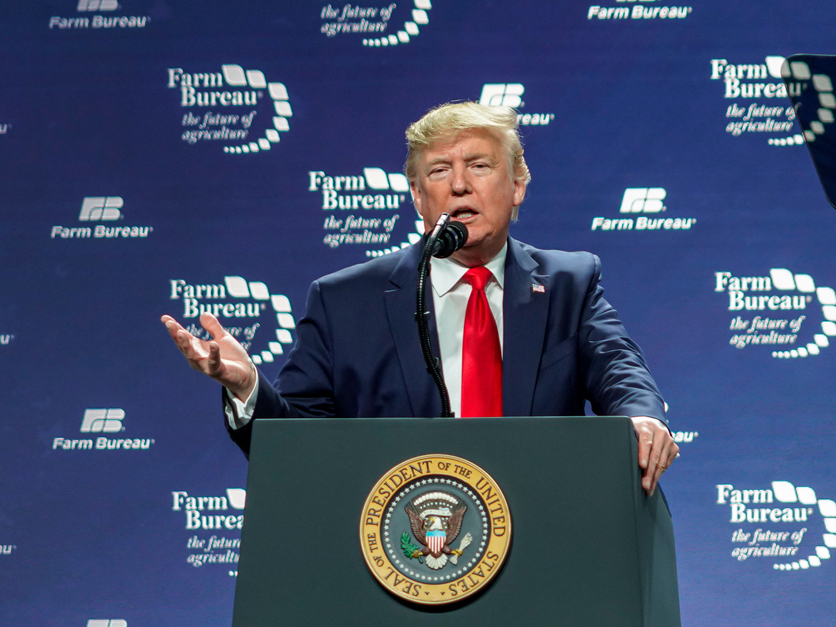Producers’ support for President Donald Trump has grown despite sluggish exports and their own worries about their financial condition as the economic slowdown triggered by the COVID-19 has developed, according to the latest Agri-Pulse poll of U.S. farmers and ranchers.
Some 72% of 600 producers nationwide who were surveyed from Feb. 19 through March 13 said th ey were willing to support Trump’s reelection, up from 69% during the fall of 2018 and 45% in the spring of 2018.
ey were willing to support Trump’s reelection, up from 69% during the fall of 2018 and 45% in the spring of 2018.
Some 21% of those surveyed for the latest poll opposed Trump’s reelection. The remaining 7% don’t know how they’ll vote or refused to say.
At the same time, nearly two-thirds of the farmers surveyed said they had at least some concerns about their ability to repay loans, and 79% said it was important that farmers receive another round of Market Facilitation Program payments this year; 46% of the producers actually said it was “very important” that farmers receive additional MFP payments.
The survey, conducted by Aimpoint Research, was done with phone interviews as the COVID-19 pandemic was developing worldwide. The interviews ended just before the federal government called for nationwide limitations on public gatherings to slow the spread of the virus. The sample included farmers and ranchers with at least $50,000 in gross farm income.
On March 15, the Centers for Disease Control and Prevention called for an end to public gatherings of more than 50 people for eight weeks. The following day, on March 16, Trump tightened the gathering limit to 10 people for 15 days. 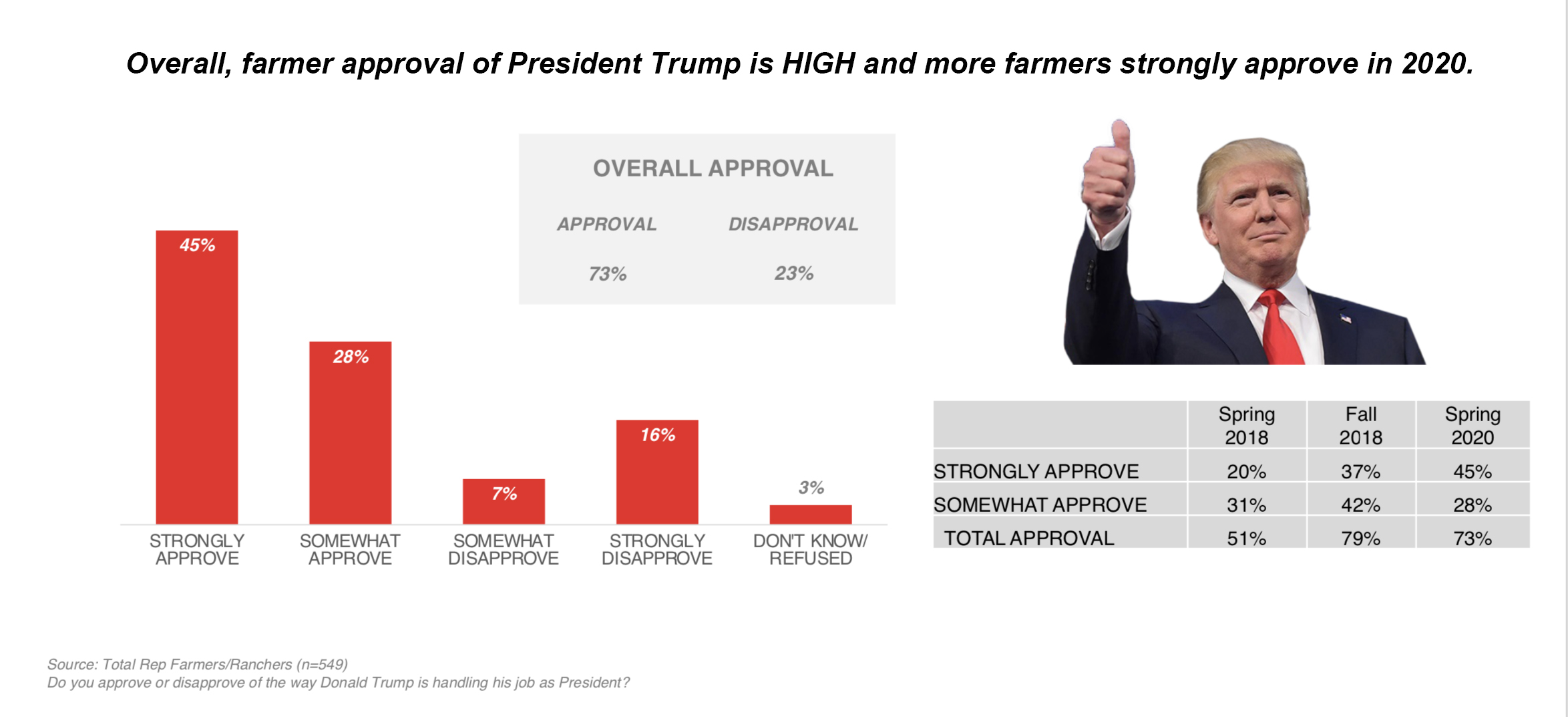
According to the survey, trade remains the top concern for farmers, while climate change remains a minor concern, if even that, for most farmers.
When the survey was conducted, producers’ rating of the farm economy had already slipped somewhat compared to the fall of 2018, when the trade war with China was raging.
Consistent with previous surveys, the poll found that farmers heavily skew Republican. Some 74% of producers surveyed said they voted for Trump in 2016, compared to 16% who backed Hillary Clinton. Sixty-four percent of those surveyed identify as Republican, while 13% said they are Democrats or lean Democratic; 19% of those surveyed identify as independents.
Farmers’ support for Trump is even more enthusiastic than it is for Agriculture Secretary Sonny Perdue, though both enjoy strong approval ratings.
Some 45% of those surveyed “strongly approve” of the job that Trump is doing and 28% “somewhat approve" of his performance for a combined approval rating of 73%.
Trump has maintained his backing among farmers because of the support he has shown for the ag sector, said Sen. John Hoeven, R-N.D. "He's worked hard to try to get better trade deals for ag. And in the meantime, because there was retaliatory action by our trading partners, particularly China ... he stepped up and provided those market facilitation payments."
The administration's actions to roll back some regulations, including the Obama-era "waters of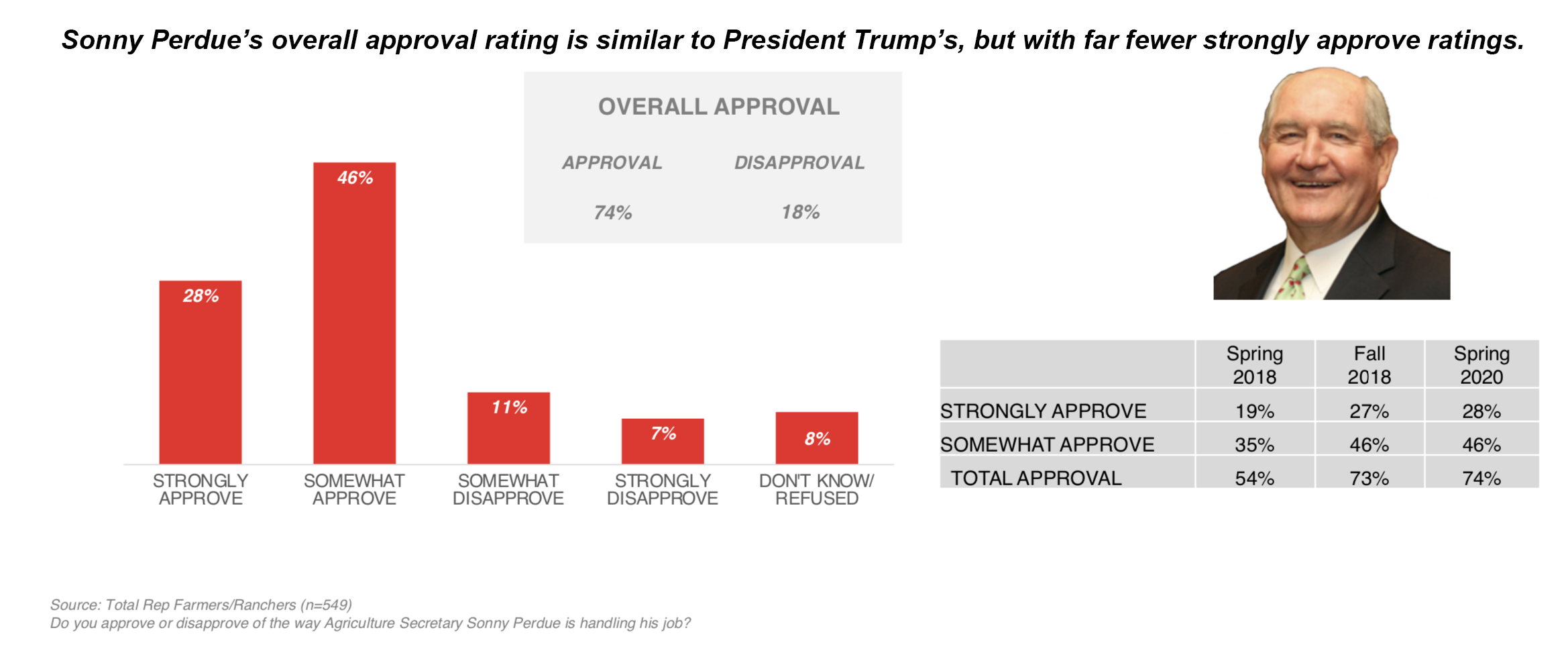 the U.S." rule that expanded the jurisdiction of the Clean Water Act, also have helped win farmers' support, Hoeven said.
the U.S." rule that expanded the jurisdiction of the Clean Water Act, also have helped win farmers' support, Hoeven said.
In the fall of 2018, Trump’s approval rating was 79%, but the share of farmers who strongly approved of his performance at that point was lower then at 37%. An earlier poll in the spring of 2018, during the lead-up to the tariff war with China, only 51% of producers approved of the job Trump was doing.
Ninety percent of the Republican or GOP-leaning farmers who were polled said they would vote for Trump this fall, compared to 48% of the independents and 24% of the Democrats.
Among farmers who said they would vote in the Democratic primary, the overwhelming plurality, 46%, favored Vice President Joe Biden, compared to 13% for Vermont Sen. Bernie Sanders and 11% for Minnesota Sen. Amy Klobuchar.
But Biden’s share is almost certainly higher at this point; when the survey interviews were starting, many candidates were still in the race. Klobuchar dropped out March 2 and endorsed Biden.
Perdue’s overall approval rating at 74% is largely unchanged from 73% in the fall of 2018 but an increase from 54% in the spring of 2018.
Still, only 28% of producers in the latest poll said they "strongly" approved of the job the secretary is doing; 46% said they “somewhat” approve of his performance.
Before the national shutdown began last week because of the COVID-1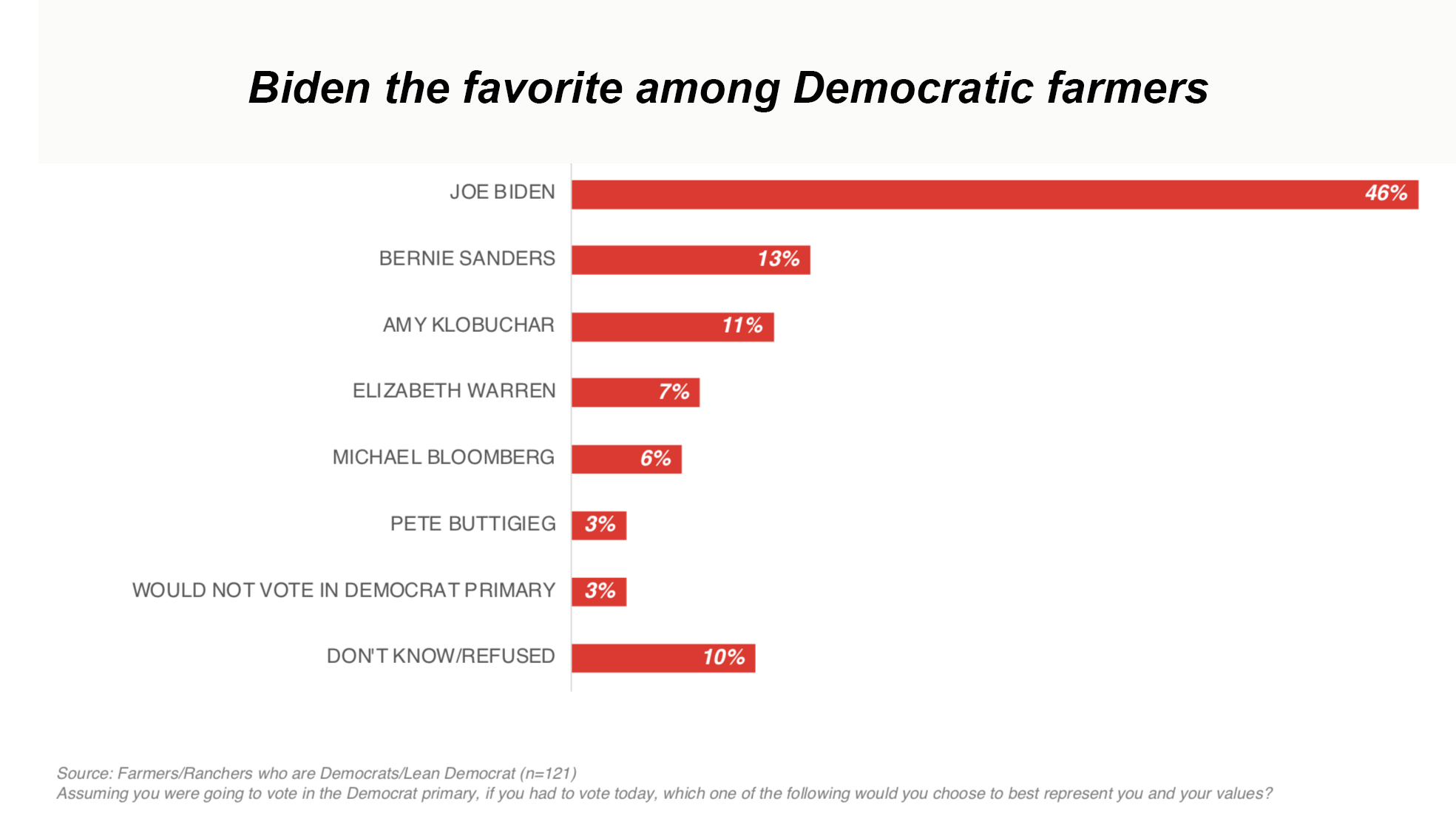 9 pandemic, producers were indicating some modest optimism about the farm economy even though they clearly have lingering concerns about their own situation. The concerns are even stronger among the largest farmers, perhaps because they may be more leveraged.
9 pandemic, producers were indicating some modest optimism about the farm economy even though they clearly have lingering concerns about their own situation. The concerns are even stronger among the largest farmers, perhaps because they may be more leveraged.
Some 71% of those surveyed said that financial conditions in agriculture were at least the same or better than a year ago, including 75% of farmers and ranchers with gross farm income of at least $1 million.
Interested in more coverage and insights? Receive a free month of Agri-Pulse or Agri-Pulse West by clicking here.
Farmers were asked to rate the condition of American agriculture on a scale of one to 10, and the average response was 5.31, down from 5.47 in the fall of 2018. Twenty-three percent now rate the condition of U.S. agriculture at the top range (8 to 10), while 24% rate it between 6 and 7, and 20% are neutral at a rating of 5.
Some 24% of those polled said they were “very concerned” about their ability to repay loans this year and 38% said they were “somewhat concerned.” Among farmers with gross farm income exceeding $1 million, 33% said they were very concerned about repaying loans and 36% said they were somewhat concerned. Among farmers with $500,000 to $1,000,000 in sales, 64% said they were "very" or "somewhat concerned."
Still, slightly over two-thirds said they would encourage a family member to come back to the farm as a career – a number that’s very comparable to our 2018 research.
The majority of farmers were at least somewhat optimistic about the impact of the “phase one” trade agreement with China. On a scale of 1 to 10 as to how satisfied they were with the deal, 42% of those surveyed responded with a rating of between 8 and 10, and 19% scored their satisfaction with the pact at 6 or 7.
Seventy-two percent of the surveyed indicated they were satisfied with the new U.S.-Mexico-Canada Agreement and 66% said they were satisfied with efforts by the Trump administration to repeal federal regulations on farms.
The survey found continued concern about the adequacy of rural broadband: 51% of those polled indicated they were at least somewhat satisfied with their internet service while 25% were neutral.
Farmers also were asked to rate various issues on a scale of 1 to 10 based on its importance to them, and trade is only growing as a top concern. Farmers gave an average score of 8.85 to the issue of “selling more U.S. farm products overseas,” That score is up from 8.65 in the fall of 2018.
“Protecting against acts of terrorism” ranked second at 8.59, essentially unchanged from 2018. Reducing the federal deficit also was unchanged and ranked third at 7.98.
The issues of “creating jobs in rural America” and “repairing infrastructure” have grown slightly importance with average scores of 7.93 and 7.92, up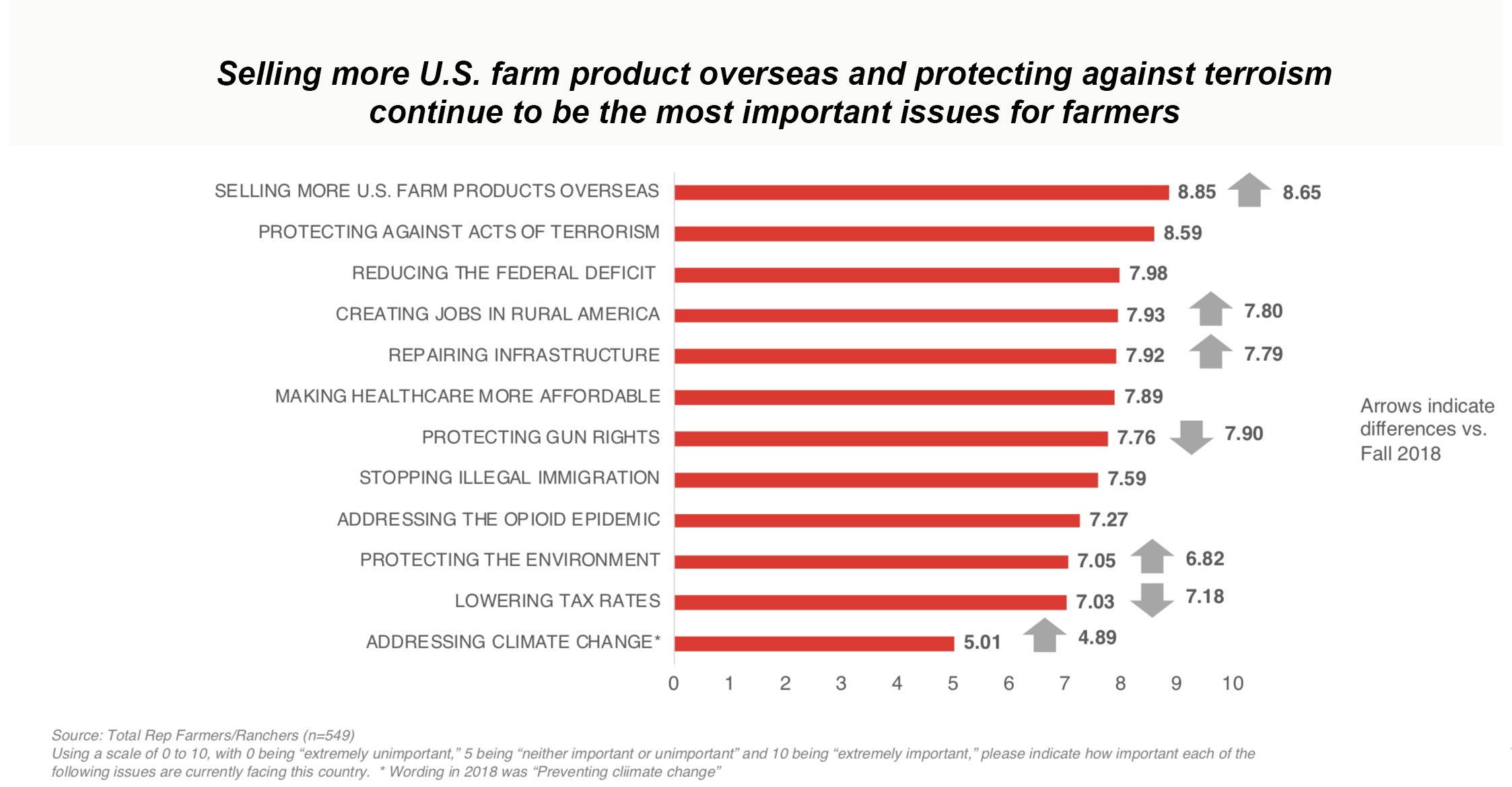 from 7.8 and 7.79 respectively in the fall of 2018. “Protecting gun rights” slipped in importance to 7.76, down from 7.9 in 2018.
from 7.8 and 7.79 respectively in the fall of 2018. “Protecting gun rights” slipped in importance to 7.76, down from 7.9 in 2018.
“Protecting the environment” grew in importance, rising form 6.82 in 2018 to 7.05 in the latest survey. “Addressing climate change” also went up slightly in importance, from 4.89 in 2018 to 5.01 in the new poll.
However, concern about the climate issue remains politically polarized. Some 62% of the farmers who identified as Democrats or said they lean Democratic rated climate change as a top concern (8 to 10 on the scale of one to 10), compared to 29% of independents and 13% of Republican farmers.
For more news, go to: www.Agri-Pulse.com.

